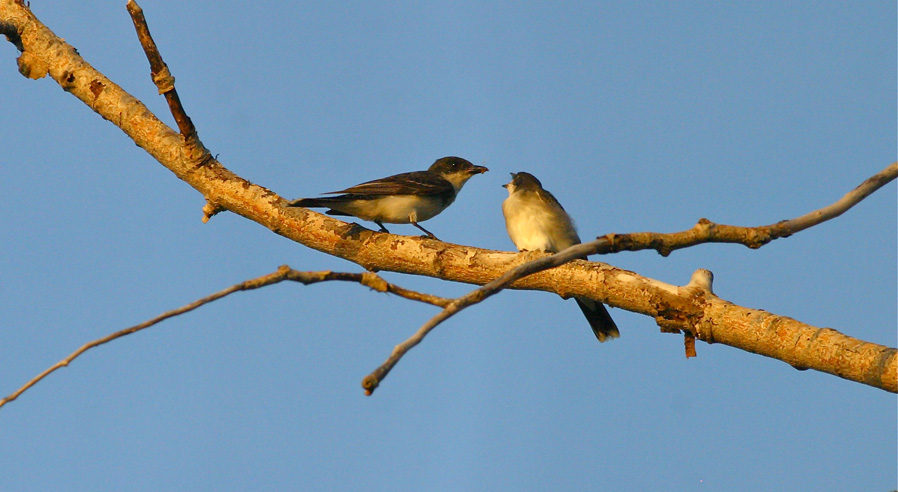An adult eastern kingbird, (Tyrannus tyrannus) left, feeds its baby high above the boardwalk at Ashbridge’s Bay in the pink rays of a beautiful sunset on Tuesday night. If you look closely, you can see the fly. © BCP 2010
You and I know the grey and white birds above as eastern kingbirds. But since 1758, when the brilliant Swedish scientist Carl Linnaeus classified this species, this bird has been known scientifically as Tyrannus tyrannus. The Tyrant tyrant.
Zoologically, this kingbird is a member of the tyrant flycatcher family. Its classification is a bit tricky. The kingbird is a passerine (commonly known as perching birds) but it isn’t a songbird. It’s a member of the suborder Tyrrani — birds that don’t have the sophisticated anatomy of voicebox (syrinx) that gives songbirds their ability to sing.
The kingbird can vocalize, but instead of singing a clear song, it produces a rapid series of high-pitched squeaks that sound like the audio equivalent of Morse code. You can listen to it at the truly wonderful Cornell Lab of Ornithology by clicking here.
-


Close-up of one of the kingbird adults I saw Tuesday evening. © BCP 2010
Close-up of one of the kingbird adults I saw Tuesday evening. © BCP 2010
In the waning (but very pink) light just before sunset Tuesday, I spent a fascinating hour or so watching a family of kingbirds at Ashbridge’s Bay. There was a solitary fledgling, and what appeared to be two parents — and numerous other adults — perched at the very top of a dead tree by the boardwalk. The adults were doing what flycatchers do — swooping about, catching flies in a very dramatic fashion. While the fledgling waited in the centre of a dead branch, easily 50 feet up, the adults took turns leaving their perch, flying out into an easy swooping loop, then landing back on the branch beside the chick to feed it.
The patience of the chick was nothing short of remarkable. It just waited, sometimes with its mouth open, sometimes not, absolutely confident that within minutes, if not moments, it would have a nice fresh mouthful of fly.
Such good parents. So why did Linnaeus call these birds tyrants? (After all, the truly terrifying T. rex derives its name from the same root.: Tyrannosaurus means tyrant lizard.)
Perhaps it is the kingbirds’ habit of aggressively defending their young and their turf that prompted Linnaeus to dub them so.
Clearly more research required.
© BCP 2010



no comments